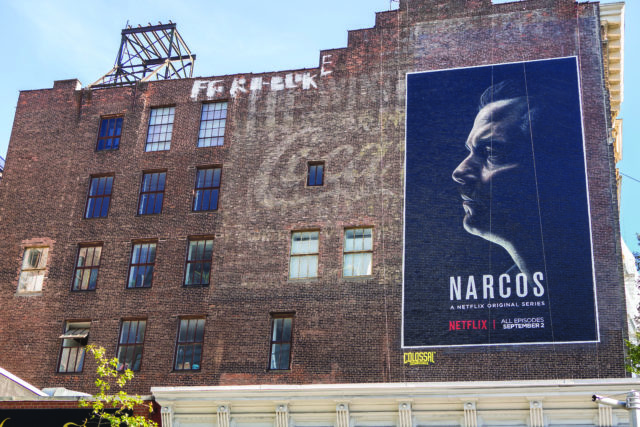
In 1994, nearly 26 years ago, if anyone had told Pablo Escobar’s family — as they were desperately trying to flee Colombia after Pablo’s death — that they were going to become part of pop culture, they would have never believed it. The family of the infamous drug lord begged for asylum in several countries without luck. From neighboring countries in South America to as far away as Mozambique, the name Escobar carried a stigma that threatened to keep the family from settling down anywhere. Finally, Argentina accepted their asylum request, but only if they changed their identities.
It makes sense that the Escobars struggled in the wake of Pablo’s violent life and death. Society condemns drug trafficking. Some of the world’s most atrocious crimes have been committed within the cartel’s underworld. Yet society can’t get enough of these narco stories, from TV shows, to movies and documentaries, drug lords are everywhere in pop culture. Where there is blood and unthinkable violence, some see glitz and glam.
One just needs to look at Juan Pablo Escobar’s Instagram account to see the flood of love and admiration for his father: “Your dad was a badass”; “Long live the boss”; “He made mistakes, but he was a loving family man who helped so many people”; “I wish I could have met him”; “I want to be like him”; “Love Pablo.” The list goes on.
Pablo Escobar’s death meant that his widow, Victoria Eugenia Henao, his son, Juan Pablo Escobar Henao, and his daughter, Manuela Escobar Henao, needed to erase their past to create a future. They started a new life in Argentina as María Isabel Santos Caballero, Sebastián Marroquín Santos and Juana Manuela Marroquín Santos. In 1999, Maria and Juan Pablo were arrested on money laundering charges in Argentina and the world found out about their whereabouts. They were released 15 months later because prosecutors could not find any evidence against them.
Once again, the family managed to stay under the radar until 2009 when Juan Pablo released Sins of my Father, a documentary that shows both Juan Pablo and his mother publicly speaking about their lives for the first time. But more significantly, Juan Pablo went to Colombia to meet the sons — and to ask for forgiveness — of two of his father’s most famous victims: presidential candidate Luis Carlos Galan and Minister of Justice Rodrigo Lara Bonilla.
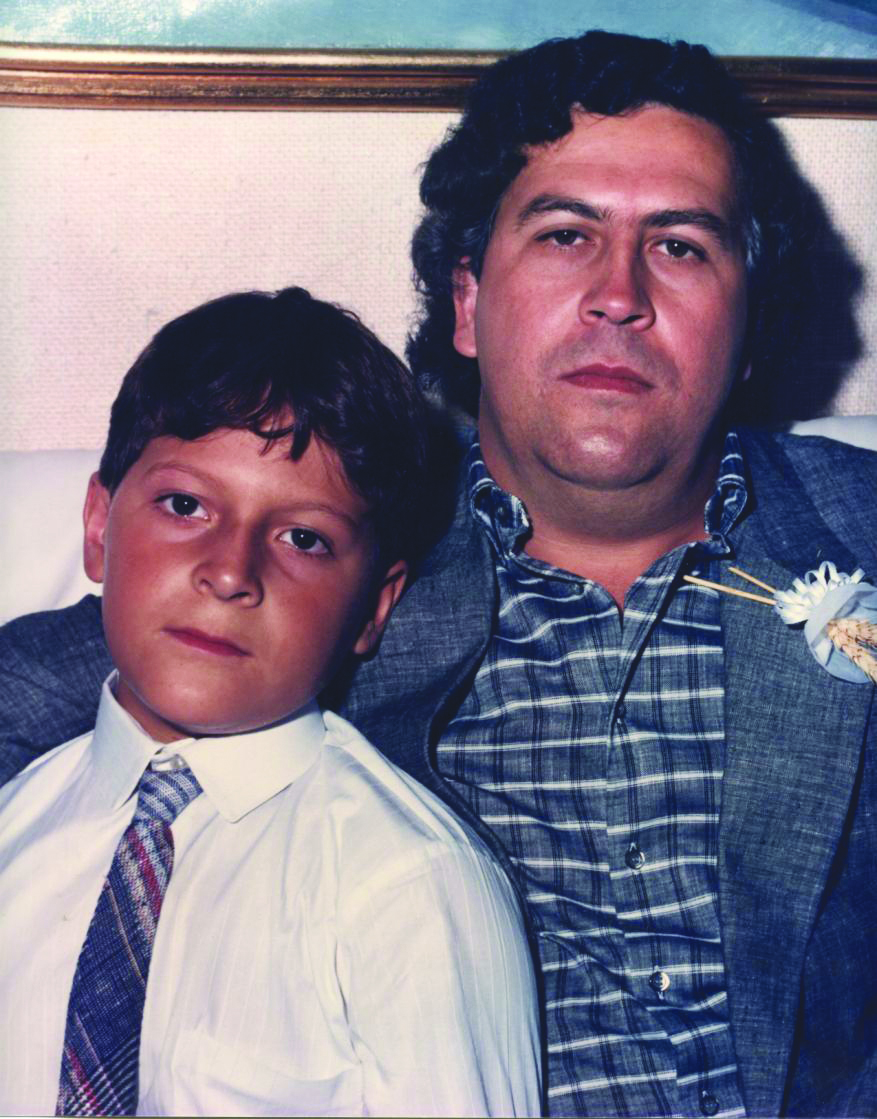
For Juan Pablo, an architect and public speaker, it was not an easy decision. It meant leaving behind a life of anonymity to expose himself and his family to the media again. A risky choice, but “it was either that or to die in absolute silence,” he says over the phone from his home today in Argentina.
“I went public to ask for forgiveness in a time in Colombia where people were talking about war. No one trusted my intentions at first. They thought I was crazy. Now they know I am not.”
Perhaps part of the reason Juan Pablo was able to return to Colombia, and the spotlight, was that since 2006, the genre of narco telenovelas changed entertainment in Colombia and around the world. Drug trafficking and the violence related to it was considered taboo for decades. Now it is entertainment.
The genre spread from productions in Colombia and Mexico until it made the crossover to the United States in 2015 with Netflix’s Narcos. But before Narcos became one of the most “binge-watched” shows in the history of the platform, there was Pablo Escobar, The Drug Lord, a Colombian show that aired in 2012 on Caracol TV, one of the country’s biggest networks.
The show was a smashing success. It broke ratings in Colombia and internationally.
The producers, Camilo Cano and Juana Uribe, were personally affected by Pablo Escobar’s violence. Cano’s father, Guillermo Cano, publisher of the newspaper El Espectador, was murdered by Escobar’s associates in 1986. Escobar’s cartel kidnaped Uribe’s mother, and her uncle, presidential candidate Luis Carlos Galan, was killed at the drug lord’s orders in 1989.
Even though the show was written and produced by victims of Escobar’s violence, the final product was highly criticized and marked an unexpected turn in talking about drug trafficking; for the first time, the image of Pablo Escobar was romanticized to the point that the audience identified more with him than with the victims.
The narco-trafficking genre wasn’t “exploited” as entertainment before, according to Juan Pablo Escobar, until the “narco-telenovelas” found their way into prime time on Colombian television. With the first two broadcast shows, Sin Tetas No Hay Paraiso (Without Boobs There Is No Paradise) and El Cartel de Los Sapos (The Cartel of Snitches), the media and the entertainment business realized they had a very lucrative market. But it was Pablo Escobar, The Drug Lord that Juan Pablo says projected his dad’s “fake idol” image out to the world.
“Although victims wrote the show, you didn’t know whether Pablo Escobar was successful, charming or evil,” says Juan Pablo. “It is shocking how these shows can embellish history, creating fake idols.”
The impact goes further for Juan Pablo, who describes a new generation of “ultra-fanatics” of his father. Some have even tattooed the infamous drug lord’s face on their bodies.
“There is an irresponsible avalanche of misinformation around my dad because of these shows,” Juan Pablo says. “From quotes he never said to false myths that only portray him as a hero.”
The myth of Pablo Escobar as a legend, someone worthy of adoration, has grown out of proportion according to his son because of mass media in Colombia and around the world.
“In the last few years, the media and entertainment business turned him into a pop-culture personality,” Juan Pablo says. “The thing is, my dad was no Andy Warhol.”
It’s true that Pablo Escobar earned respect and appreciation from people in his hometown of Medellín, Colombia. He turned one of the city’s most impoverished communities into a decent neighborhood, built sports facilities, and provided food and medicine for poor communities. But that’s only half the story: He has been credited with the detonation of 195 bombs, organizing 623 attacks and, perhaps most famously, bombing a commercial airplane with 111 passengers on board. Overall, 5,500 people died related to the violence of Escobar’s cartel between 1989 and 1993, according to official police records.
It might be hard to understand how Colombian society let the narco-trafficking genre become their No. 1 choice of television entertainment considering that, in the last 60 years, the country has seen 262,197 deaths related to violent groups like cartels, according to the Historic Memorial National Center of Bogotá. For Juan Pablo, the reason is due to the “double standards” of the media.
“These series have distorted historical facts by glorifying characters who did terrible things — like my dad — but then, like in the case of Caracol TV, they will condemn anything related to narco-trafficking in their news programming, and right after they will air a telenovela praising the life of narco lords,” Juan Pablo says.
Rodrigo Lara Restrepo, a politician and senator in Colombia, condemns the way the media has turned such a delicate topic into a money-making entertainment machine. Lara was 8 years old when his dad, Rodrigo Lara Bonilla, the former Minister of Justice of Colombia, was slain for standing against Escobar and his cartel in 1984. Lara is horrified by the extent of the narco culture in society.
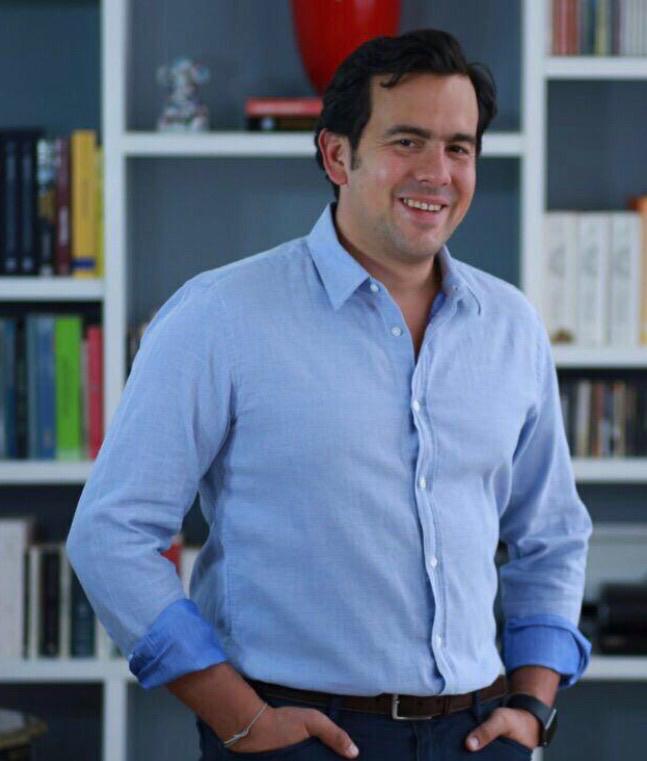
For Lara, the main problem with these shows is that violence, criminality and corruption cannot be taken lightly.
“Characters such as Pablo Escobar cannot be humanized,” Lara says, because it gives a sense of normalcy to heinous crimes. “I think in Germany it would be unthinkable to do a TV show where they humanized Hitler.”
Lara compares the “normalization” of the crime and violence of the narco world in TV shows with the philosophical concept of “banality of evil,” introduced by philosopher Hannah Ardent in her 1963 report on the trial of Adolf Eichmann in Jerusalem. Ardent, a Holocaust survivor, argued that Eichmann’s crimes were committed daily, not because he was inherently evil, but because he was a member of the Nazi party and was following orders without remorse. She used the word “banal” to explain that for Eichmann, the crimes committed against Jews were ordinary because it was happening every day in all the Nazi territories.
For Lara, when producers take the history of a criminal like Pablo Escobar and adapt it for a TV show, they end up banalizing the harm; episode by episode, society starts to see the violence from drug lords and their cartels as something normal.
“In a fictional show, even if it includes historical facts, like in Pablo Escobar, The Drug Lord, the writers needed to entertain the audience by showing the charming, successful and family side of Escobar, minimizing the extent of his crimes,” Lara says.
Following the same idea, Juan Pablo believes that to reconstruct such a complicated and traumatic story, it has to be without fiction, without glamorizing his dad’s crimes.
“The victims deserve the absolute truth,” he says. “It is the only way to try to repair the damage caused.”
Lara doesn’t think that producers are intentionally looking to normalize violence, but in the end they want to sell a product. In the case of Pablo Escobar, The Drug Lord, Lara was approached by the producers, Cano and Uribe, and after reading the script he told them he didn’t support their project.
“You can’t banalize evil like that, especially people who were victims themselves,” Lara says.
Juan Pablo is shocked and worried by the flourishing number of Pablo Escobar fans around the world, from a Russian guy who sent him a photo proudly showing how he tattooed his entire back with Pablo’s face, to youngsters asking Juan Pablo how to get into the drug trafficking business.
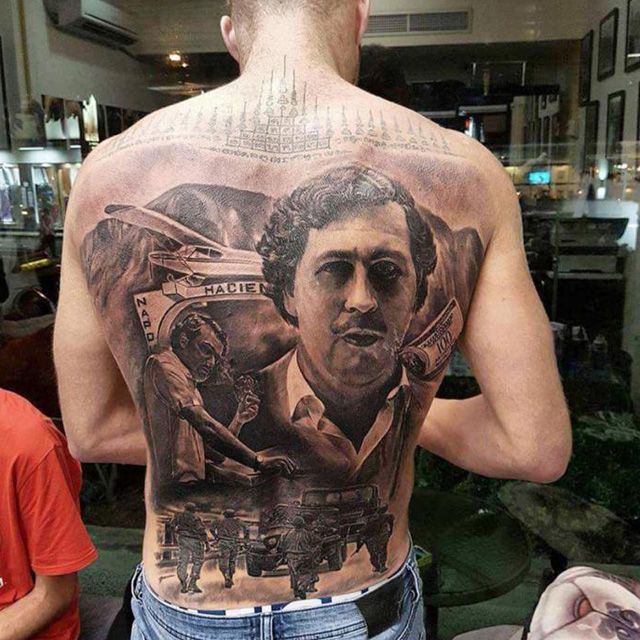
“I receive fan mail and thousands of comments on social media from people asking me how to become narcos,” Juan Pablo says. “Even from Africa, Pakistan and Afghanistan. I don’t even know how they got access to these shows there. It’s out of control.”
Kenneth Dowler, a professor from Wilfrid Laurier University in Canada who teaches courses on crime, gangs and justice, says that the fascination with gangsters and drug lords is not a new phenomenon. In fact, the gangster genre has been prominent since the 1930s with James Cagney films like The Public Enemy (1931). In 1934, after a few particularly risque films, the “Hays Code” set out some guidelines for the motion picture industry. From then on, gangsters would either have to die or be imprisoned at the end of the film. Basically, according to Dowler, they wanted to show the idea that crime doesn’t pay.
Like the older Italian mafia films, more recent series on drug lords romanticize the characters and glamorize the misdeeds of the protagonist, according to Dowler. In series that are based on true stories, they minimize the harms of their crimes on society because the producers want the audience to relate to the lead character in some way, even if they are criminals who commit unthinkable violence.
“Producers don’t show the true consequences of the crimes committed by the protagonists because they need the audience to relate to them,” Dowler says. “They can’t show them as entirely evil, so they make them cartoonish in a way. Indeed, they show murder and violence, but minimizing the harms to society.”
Andrés López López is on both sides of the spectrum, from being a drug lord himself to winning an Emmy as a producer and writer of a narco series. López was a high-ranking member of the Cartel del Norte del Valle in Colombia. The group gained power after Pablo Escobar’s death, allegedly smuggling 60 percent of the total amount of cocaine to the United States in the ’90s.
Nowadays, López lives in Miami and has since paid his debt to society after he cut a deal with the Drug Enforcement Agency in the early 2000s. From a bunk bed in a Florida prison, López wrote a book that later became the second-ever narco TV show in Colombia, The Snitch Cartel. The show was so successful that it later became a film, and López wrote more books and collaborated with the production of other fictional narco telenovelas.
López says that by telling these stories they are not looking to teach society a lesson, but to entertain. That is the reason why violent protagonists are romanticized in these shows.
“If you make a character too evil, the audience will hate them, and the show will be a failure,” he says. “The entertainment business is meant to be enjoyed by the audience.”

Beyond high ratings and profits, Dowler believes narco movies and series provide no real benefit to society because these series don’t fully explore violence and social costs, nor do they explore the economic issues that go along with having national economies rely heavily on drug trafficking and the corruption that goes with it. Furthermore, these productions don’t show how the everyday person who lives close to the cartels has to deal with the outcomes of drug violence.
For López, it’s crystal clear that the protagonists of these shows are anti-heroes.
“We are not trying to tell the audience to follow their examples,” he says. “In fact, we show how they all have bad endings.”
Still, the narco genre in popular culture should not be considered an educational tool for society, according to López.
“It is not up to Netflix or producers to educate society. We as parents are in charge of teaching our kids,” he says. “Plus, there are other shows and content to do so.”
Joshua Mintz, a Mexican television executive and producer, is the mind behind two of the biggest narco-telenovelas in history, El Señor de Los Cielos (Lord of the Skies), and La Reina del Sur (The Queen of the South). Mintz’ productions morphed Mexico’s well-known cheesy soap operas into elaborate series that mixed fiction with historical facts about the drug business and violence in the country.
Controversy has erupted from these productions. Last year, Mauricio Ochmann, the actor who played one of the most notorious fictional drug lords of El Senor de Los Cielos, announced he was not going to play the character anymore because children of all ages were telling him how much they idolized his character, El Chema.
For Mintz, it is not the media that creates social realities, but the other way around.
“I don’t think that because there are more TV shows about narcos, there is going to be more drug trafficking,” he says.“It is like saying that children will jump from balconies thinking they can fly after watching Batman.”
It is “relatively rare,” according to Dowler, the professor who studies crime in Canada, that people who are fascinated with gangsters will become gangsters themselves. People like watching true crime entertainment because it provides an escape from a somewhat mundane existence — the viewer can vicariously live out the fantasy of being powerful and wealthy, Dowler says, even through illegal means. It is, in a way, a dark version of the American dream.
Most criminals, Dowler says, live day-to-day escaping justice, in and out of jail, with traumatic consequences for their family members in most cases. It’s a lifestyle that most people wouldn’t want to live, but narco shows have driven popular culture to minimize these facts.
Juan Pablo is not against telling his father’s story — he has, in fact, made money off of it, producing two documentaries and writing two books. He is critical of shows that tell a glamorized version of a complicated and traumatic story. He insists he reveals the real story so history won’t repeat itself — so there won’t be another Pablo Escobar. According to Juan Pablo, that is the reason his two documentaries are not on the Netflix platform, and also why Netflix declined his help in creating the first two seasons of Narcos that focused on his father.
“If I had wanted to tell the side of the story that involved parties, excess and wealth, they will be showing my documentaries right now,” he says.
There was a time when Juan Pablo had a $4 million price on his head just because he was Pablo’s son. His sister, Manuela, lost partial hearing after a bomb exploded outside of the family home. His dad’s last years were spent hiding and escaping death, his family caught in the middle.
Juan Pablo says that living in hiding, especially in those final years, was not done in mansions surrounded by beautiful women. It was scary and precarious.
“I remember once when I was hiding with my dad in a rural house, and we couldn’t buy food, and we had $4 million in cash with us,” Juan Pablo says. “Yet we were starving.”
Today Juan Pablo travels around the world promoting his books and talking about the violent realities of his father’s life. Still, his father’s “rockstar” persona precedes him. Once on a book signing in Lithuania, he was greeted by people screaming, “The flesh,” referring to him as being the flesh of the “Almighty Escobar.”
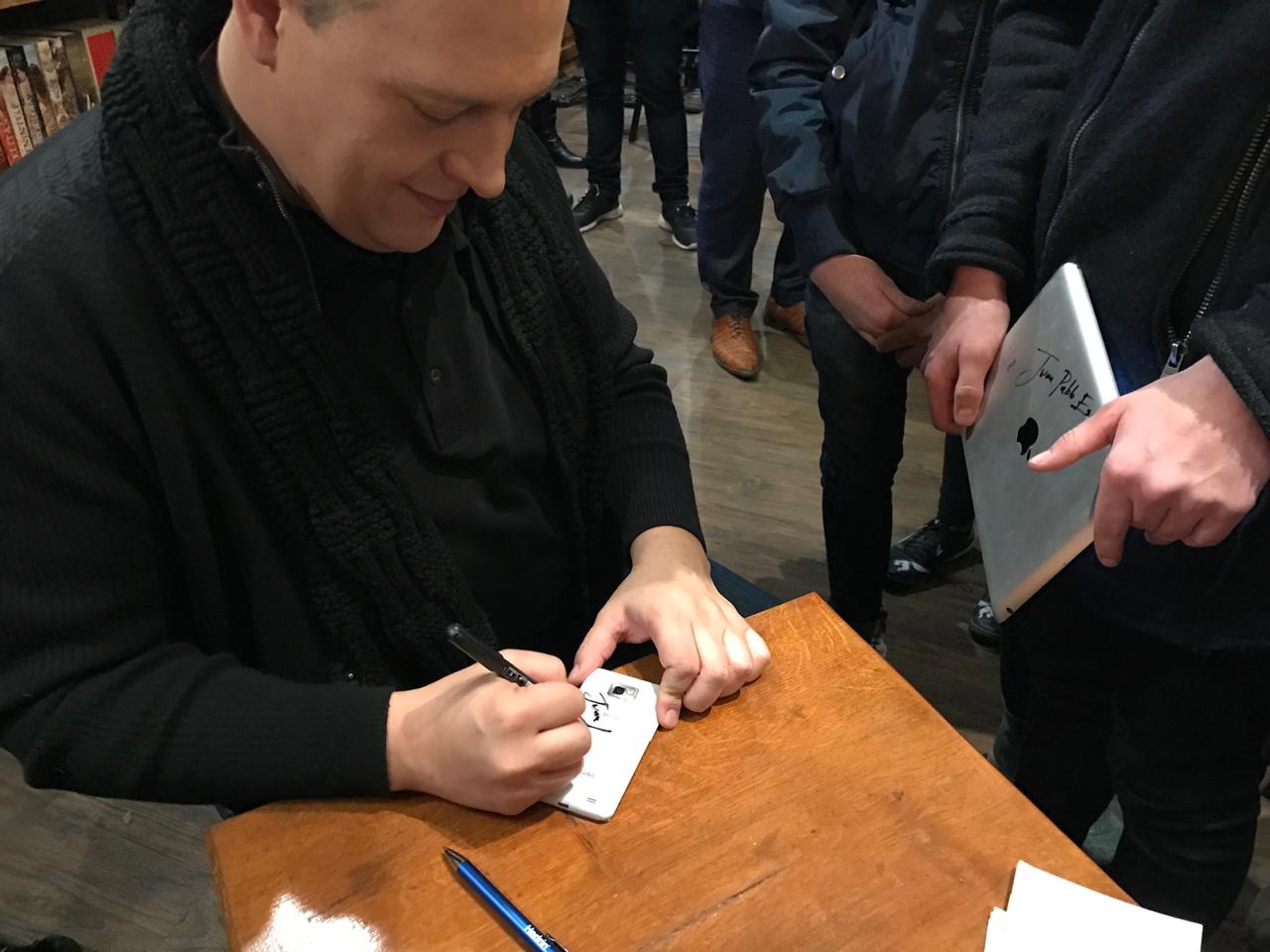
But there is one story that gives Juan Pablo hope his books and documentaries are having a positive impact on society. While at a book signing in Argentina, a 13-year-old boy told Juan Pablo that his dad drove him 250 miles to meet him. The kid had brought copies of Juan Pablo’s books, worn and highlighted with notes. The boy said he became a fan of Pablo Escobar after watching the Colombian show about the drug lord with his grandmother.
Then the boy gave Juan Pablo a letter.
“He said that after watching the show, he wanted to be like my dad, he wanted to be a bandit,” Juan Pablo says. “Then he read my books, and he no longer wanted to be a drug lord but a journalist.”
While Juan Pablo gets paid for many of his conferences, he gives just as many free ones to communities with at-risk youth, especially in Mexican cities that are overcome with cartel violence. He claims to have reached out to more than 100,000 at-risk Mexican teenagers to tell them why he decided not to be a criminal.
“Being an architect is not as profitable as being a narco, but I live a tranquil life,” Juan Pablo says. “In the end, my dad, with all the money in the world, couldn’t buy peace.”
There was a time when having a billboard with Pablo Escobar’s face would have been unthinkable. Before the Narcos Netflix premiere, such billboards popped up around the United States, from New York to Miami. Even though it was Wagner Moura’s face — the actor who played Escobar — Juan Pablo was shocked to see how the economic power and force of a TV show transformed his dad into “some Superman.”
Lara Restrepo is glad he never had the chance to see any of these billboards; he is disturbed by how mass media has irresponsibly used Escobar’s image to create a money-making brand. The audience gets mesmerized by a man who caused irreparable damage to society, while Lara lives through the outrage of seeing his father’s murderer immortalized.
The Narcos boom even created a phenomenon of “narco tours” in Medellín, Colombia. People from all over the world travel to Escobar’s hometown to visit the infamous Hacienda Nápoles, the well-known compound the drug lord turned into a zoo; La Catedral, the prison he built for himself; his grave, and other key sites. Even one of Escobar’s former hitmen, today a YouTube sensation, gives tours, and Escobar’s brother Roberto worked as a tour guide too. There was no focus on the victims, only celebration of Pablo.
The narco tours outraged the City of Medellín to the point that the mayor closed Roberto Escobar’s museum — he was charging $35 per visit, per person — and demolished Escobar’s last residence, Monaco Building. The City also began offering tours to focus on the victims’ stories.
The Narcos’ effect even made it to Joaquín “El Chapo” Guzmán’s trial in New York this January. One of the world’s most notorious drug lords and the leader of the Sinaloa Cartel in Mexico, El Chapo became well-known for his many prison breaks, his ruthless war against rivals and for being, like Pablo Escobar, a benefactor of the poor. The trial was heavily guarded; still, writers from Narcos were there, taking notes for future episodes.

During the trial, the actor who plays the drug lord on the Netflix show, Alejandro Edda, waited in line and entered the trial as part of the public. Once inside, he approached Guzmán’s lawyers and told them who he was. The real El Chapo acknowledged Edda and nodded, giving him his approval.
Edda said the reason he went was to study Guzmán’s mannerisms for the upcoming season of the show. He left the trial after his brief, “surreal” encounter with El Chapo, “shaking.” The next day, it was not the gruesome details of the tortures and killings ordered by Guzmán that made headlines, but how El Chapo met El Chapo.














